University IT Ethics: Ethical Theory Case Study Analysis
VerifiedAdded on 2023/01/10
|6
|1434
|98
Essay
AI Summary
This essay analyzes an IT ethics case study concerning an intern instructed to copy source code for website development, examining the ethical implications through four classical ethical theories: utilitarianism, deontology, contract, and virtue. The analysis reveals the unethical nature of the situation, as copying code for a client's project violates ethical principles across all considered theories. The essay argues that such actions are unethical, as they undermine the intern's learning, fail to provide original work, and potentially infringe on copyright. The conclusion emphasizes that none of the ethical theories support the practice of copying code and highlights the importance of ethical conduct in information technology.
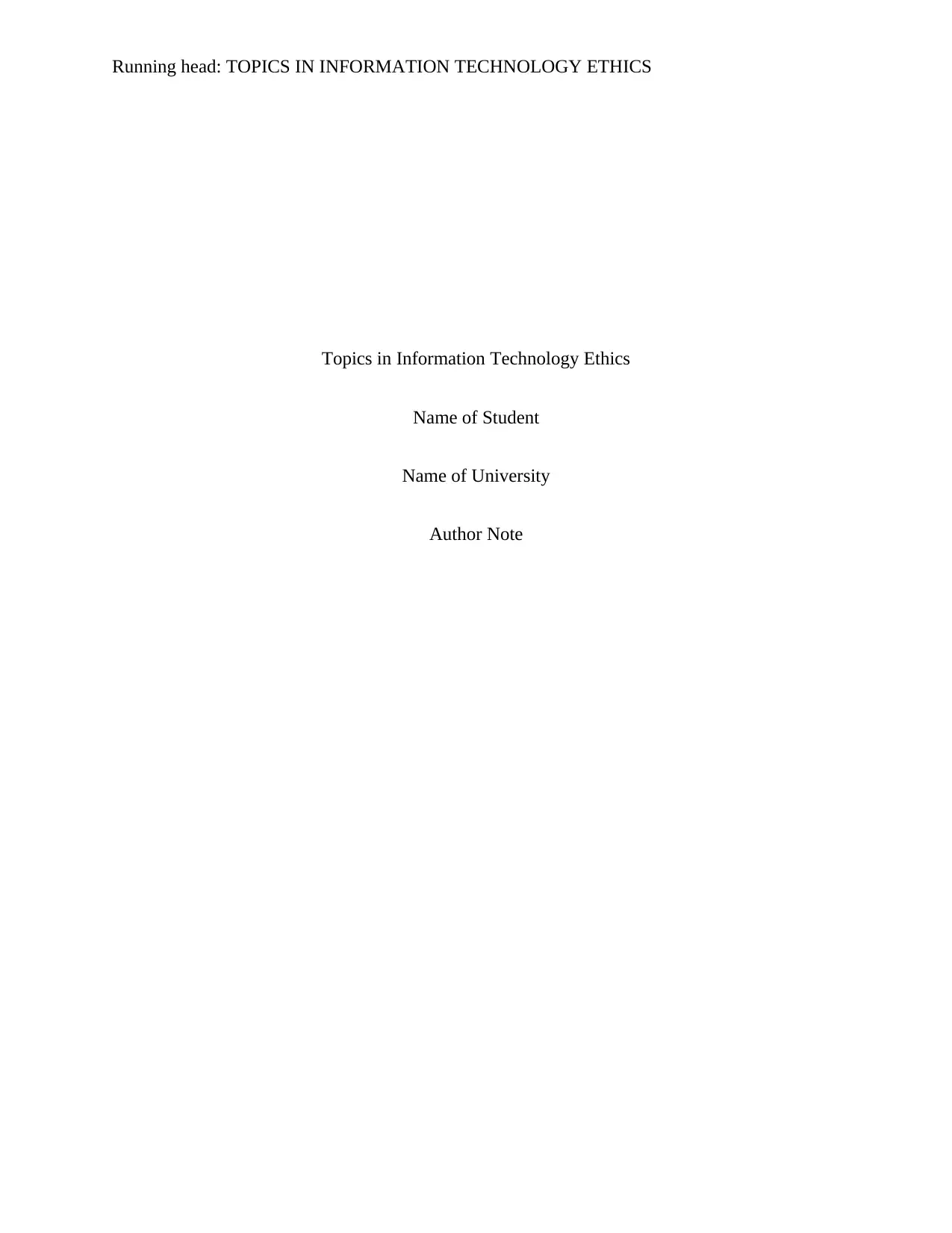
Running head: TOPICS IN INFORMATION TECHNOLOGY ETHICS
Topics in Information Technology Ethics
Name of Student
Name of University
Author Note
Topics in Information Technology Ethics
Name of Student
Name of University
Author Note
Paraphrase This Document
Need a fresh take? Get an instant paraphrase of this document with our AI Paraphraser
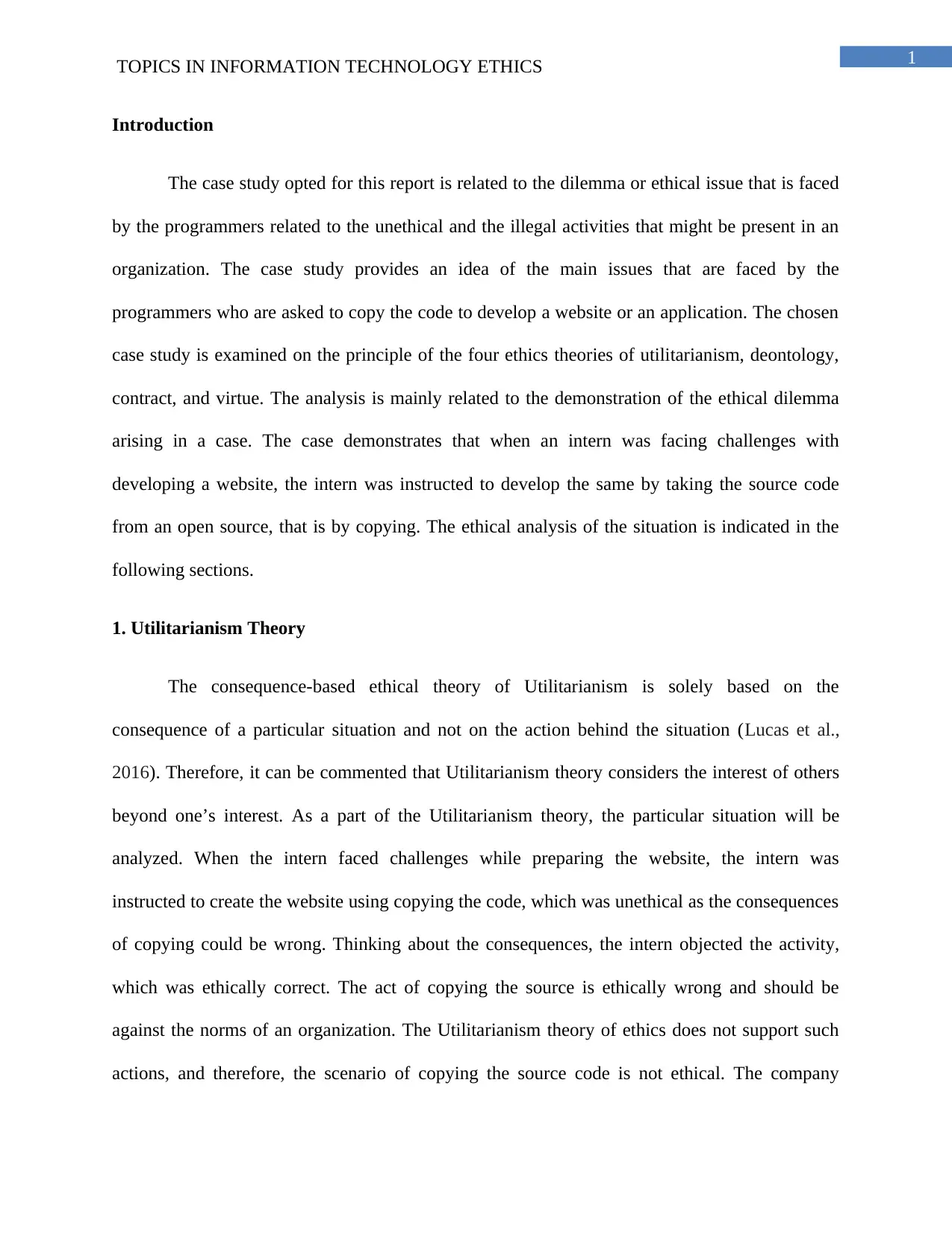
1TOPICS IN INFORMATION TECHNOLOGY ETHICS
Introduction
The case study opted for this report is related to the dilemma or ethical issue that is faced
by the programmers related to the unethical and the illegal activities that might be present in an
organization. The case study provides an idea of the main issues that are faced by the
programmers who are asked to copy the code to develop a website or an application. The chosen
case study is examined on the principle of the four ethics theories of utilitarianism, deontology,
contract, and virtue. The analysis is mainly related to the demonstration of the ethical dilemma
arising in a case. The case demonstrates that when an intern was facing challenges with
developing a website, the intern was instructed to develop the same by taking the source code
from an open source, that is by copying. The ethical analysis of the situation is indicated in the
following sections.
1. Utilitarianism Theory
The consequence-based ethical theory of Utilitarianism is solely based on the
consequence of a particular situation and not on the action behind the situation (Lucas et al.,
2016). Therefore, it can be commented that Utilitarianism theory considers the interest of others
beyond one’s interest. As a part of the Utilitarianism theory, the particular situation will be
analyzed. When the intern faced challenges while preparing the website, the intern was
instructed to create the website using copying the code, which was unethical as the consequences
of copying could be wrong. Thinking about the consequences, the intern objected the activity,
which was ethically correct. The act of copying the source is ethically wrong and should be
against the norms of an organization. The Utilitarianism theory of ethics does not support such
actions, and therefore, the scenario of copying the source code is not ethical. The company
Introduction
The case study opted for this report is related to the dilemma or ethical issue that is faced
by the programmers related to the unethical and the illegal activities that might be present in an
organization. The case study provides an idea of the main issues that are faced by the
programmers who are asked to copy the code to develop a website or an application. The chosen
case study is examined on the principle of the four ethics theories of utilitarianism, deontology,
contract, and virtue. The analysis is mainly related to the demonstration of the ethical dilemma
arising in a case. The case demonstrates that when an intern was facing challenges with
developing a website, the intern was instructed to develop the same by taking the source code
from an open source, that is by copying. The ethical analysis of the situation is indicated in the
following sections.
1. Utilitarianism Theory
The consequence-based ethical theory of Utilitarianism is solely based on the
consequence of a particular situation and not on the action behind the situation (Lucas et al.,
2016). Therefore, it can be commented that Utilitarianism theory considers the interest of others
beyond one’s interest. As a part of the Utilitarianism theory, the particular situation will be
analyzed. When the intern faced challenges while preparing the website, the intern was
instructed to create the website using copying the code, which was unethical as the consequences
of copying could be wrong. Thinking about the consequences, the intern objected the activity,
which was ethically correct. The act of copying the source is ethically wrong and should be
against the norms of an organization. The Utilitarianism theory of ethics does not support such
actions, and therefore, the scenario of copying the source code is not ethical. The company
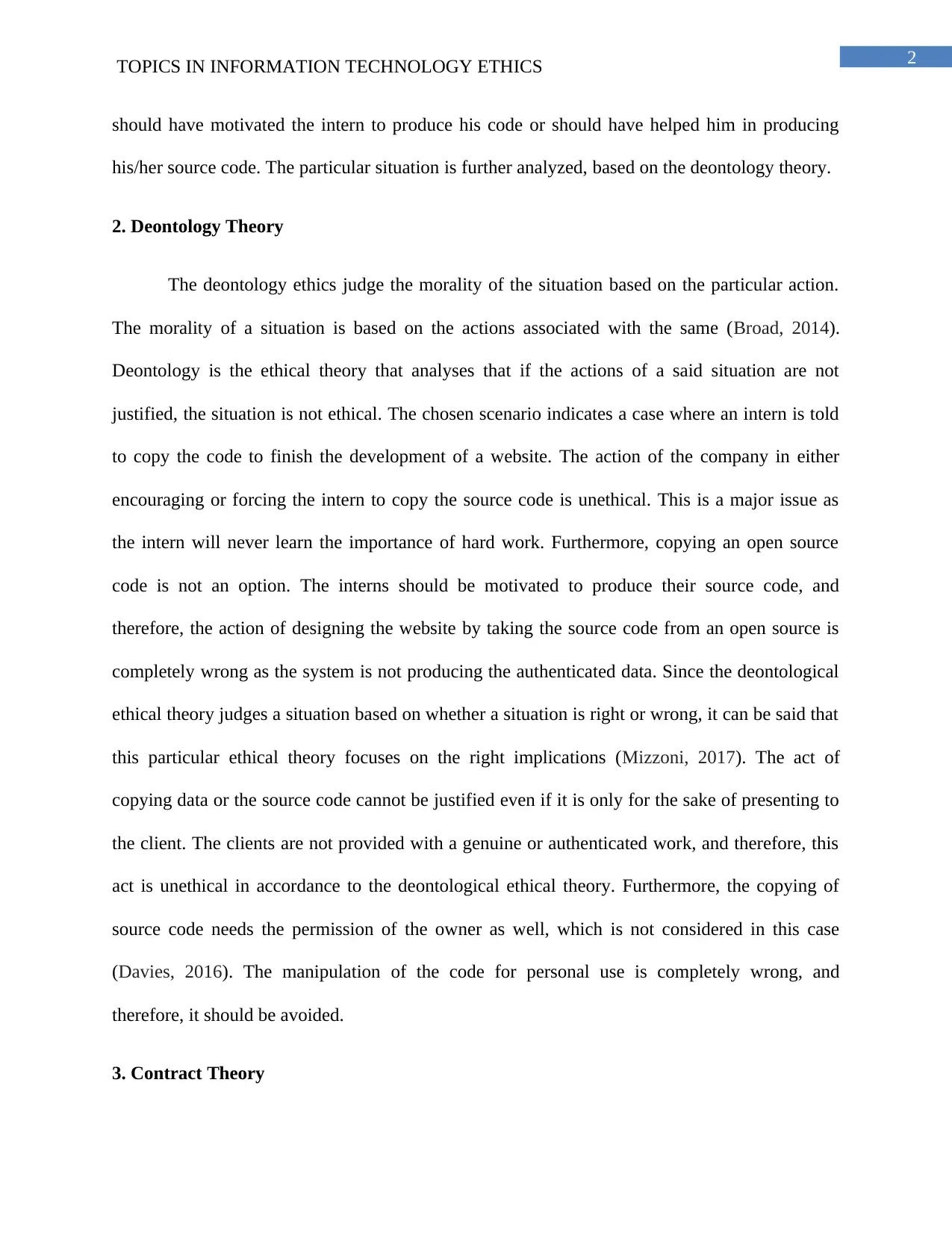
2TOPICS IN INFORMATION TECHNOLOGY ETHICS
should have motivated the intern to produce his code or should have helped him in producing
his/her source code. The particular situation is further analyzed, based on the deontology theory.
2. Deontology Theory
The deontology ethics judge the morality of the situation based on the particular action.
The morality of a situation is based on the actions associated with the same (Broad, 2014).
Deontology is the ethical theory that analyses that if the actions of a said situation are not
justified, the situation is not ethical. The chosen scenario indicates a case where an intern is told
to copy the code to finish the development of a website. The action of the company in either
encouraging or forcing the intern to copy the source code is unethical. This is a major issue as
the intern will never learn the importance of hard work. Furthermore, copying an open source
code is not an option. The interns should be motivated to produce their source code, and
therefore, the action of designing the website by taking the source code from an open source is
completely wrong as the system is not producing the authenticated data. Since the deontological
ethical theory judges a situation based on whether a situation is right or wrong, it can be said that
this particular ethical theory focuses on the right implications (Mizzoni, 2017). The act of
copying data or the source code cannot be justified even if it is only for the sake of presenting to
the client. The clients are not provided with a genuine or authenticated work, and therefore, this
act is unethical in accordance to the deontological ethical theory. Furthermore, the copying of
source code needs the permission of the owner as well, which is not considered in this case
(Davies, 2016). The manipulation of the code for personal use is completely wrong, and
therefore, it should be avoided.
3. Contract Theory
should have motivated the intern to produce his code or should have helped him in producing
his/her source code. The particular situation is further analyzed, based on the deontology theory.
2. Deontology Theory
The deontology ethics judge the morality of the situation based on the particular action.
The morality of a situation is based on the actions associated with the same (Broad, 2014).
Deontology is the ethical theory that analyses that if the actions of a said situation are not
justified, the situation is not ethical. The chosen scenario indicates a case where an intern is told
to copy the code to finish the development of a website. The action of the company in either
encouraging or forcing the intern to copy the source code is unethical. This is a major issue as
the intern will never learn the importance of hard work. Furthermore, copying an open source
code is not an option. The interns should be motivated to produce their source code, and
therefore, the action of designing the website by taking the source code from an open source is
completely wrong as the system is not producing the authenticated data. Since the deontological
ethical theory judges a situation based on whether a situation is right or wrong, it can be said that
this particular ethical theory focuses on the right implications (Mizzoni, 2017). The act of
copying data or the source code cannot be justified even if it is only for the sake of presenting to
the client. The clients are not provided with a genuine or authenticated work, and therefore, this
act is unethical in accordance to the deontological ethical theory. Furthermore, the copying of
source code needs the permission of the owner as well, which is not considered in this case
(Davies, 2016). The manipulation of the code for personal use is completely wrong, and
therefore, it should be avoided.
3. Contract Theory
⊘ This is a preview!⊘
Do you want full access?
Subscribe today to unlock all pages.

Trusted by 1+ million students worldwide
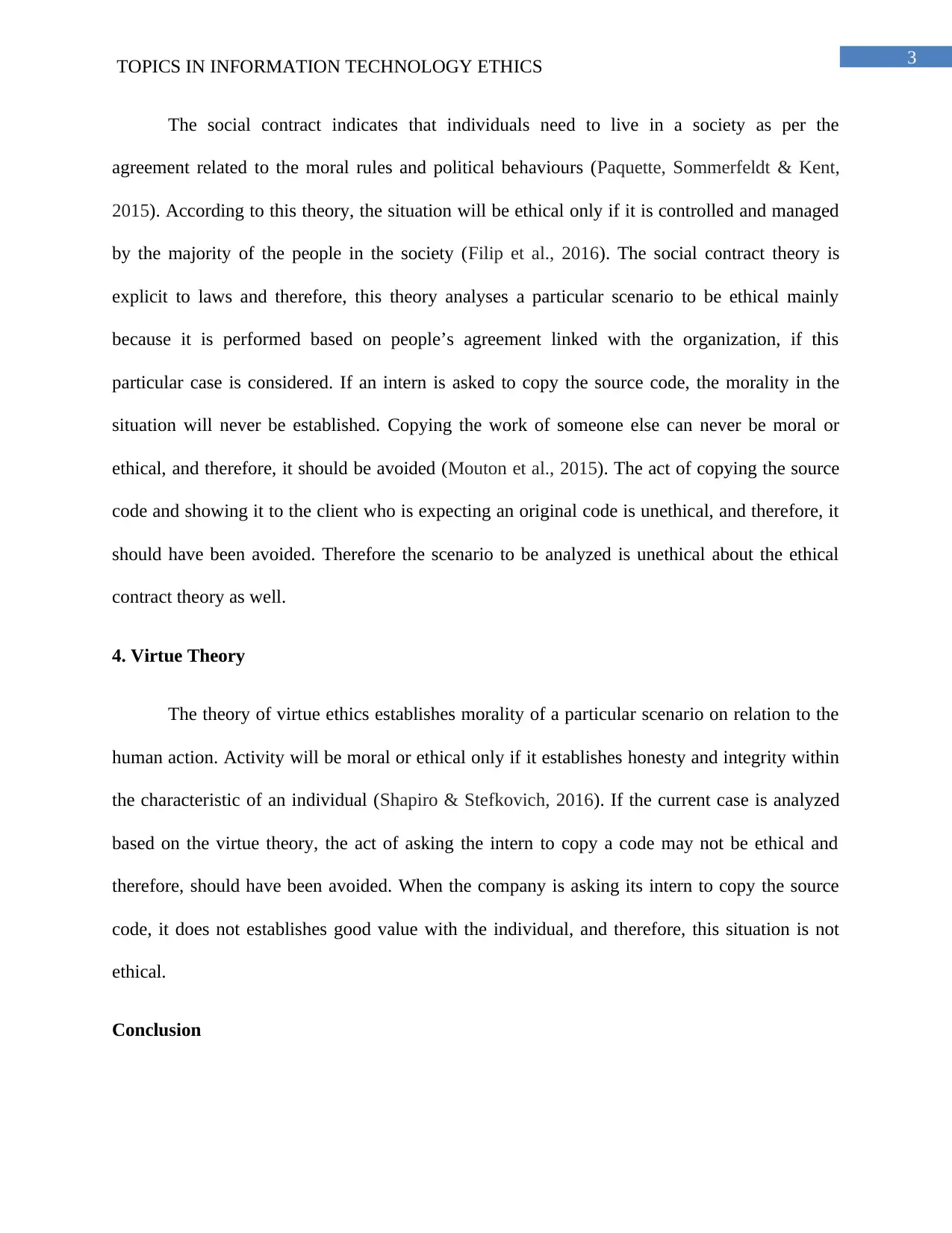
3TOPICS IN INFORMATION TECHNOLOGY ETHICS
The social contract indicates that individuals need to live in a society as per the
agreement related to the moral rules and political behaviours (Paquette, Sommerfeldt & Kent,
2015). According to this theory, the situation will be ethical only if it is controlled and managed
by the majority of the people in the society (Filip et al., 2016). The social contract theory is
explicit to laws and therefore, this theory analyses a particular scenario to be ethical mainly
because it is performed based on people’s agreement linked with the organization, if this
particular case is considered. If an intern is asked to copy the source code, the morality in the
situation will never be established. Copying the work of someone else can never be moral or
ethical, and therefore, it should be avoided (Mouton et al., 2015). The act of copying the source
code and showing it to the client who is expecting an original code is unethical, and therefore, it
should have been avoided. Therefore the scenario to be analyzed is unethical about the ethical
contract theory as well.
4. Virtue Theory
The theory of virtue ethics establishes morality of a particular scenario on relation to the
human action. Activity will be moral or ethical only if it establishes honesty and integrity within
the characteristic of an individual (Shapiro & Stefkovich, 2016). If the current case is analyzed
based on the virtue theory, the act of asking the intern to copy a code may not be ethical and
therefore, should have been avoided. When the company is asking its intern to copy the source
code, it does not establishes good value with the individual, and therefore, this situation is not
ethical.
Conclusion
The social contract indicates that individuals need to live in a society as per the
agreement related to the moral rules and political behaviours (Paquette, Sommerfeldt & Kent,
2015). According to this theory, the situation will be ethical only if it is controlled and managed
by the majority of the people in the society (Filip et al., 2016). The social contract theory is
explicit to laws and therefore, this theory analyses a particular scenario to be ethical mainly
because it is performed based on people’s agreement linked with the organization, if this
particular case is considered. If an intern is asked to copy the source code, the morality in the
situation will never be established. Copying the work of someone else can never be moral or
ethical, and therefore, it should be avoided (Mouton et al., 2015). The act of copying the source
code and showing it to the client who is expecting an original code is unethical, and therefore, it
should have been avoided. Therefore the scenario to be analyzed is unethical about the ethical
contract theory as well.
4. Virtue Theory
The theory of virtue ethics establishes morality of a particular scenario on relation to the
human action. Activity will be moral or ethical only if it establishes honesty and integrity within
the characteristic of an individual (Shapiro & Stefkovich, 2016). If the current case is analyzed
based on the virtue theory, the act of asking the intern to copy a code may not be ethical and
therefore, should have been avoided. When the company is asking its intern to copy the source
code, it does not establishes good value with the individual, and therefore, this situation is not
ethical.
Conclusion
Paraphrase This Document
Need a fresh take? Get an instant paraphrase of this document with our AI Paraphraser
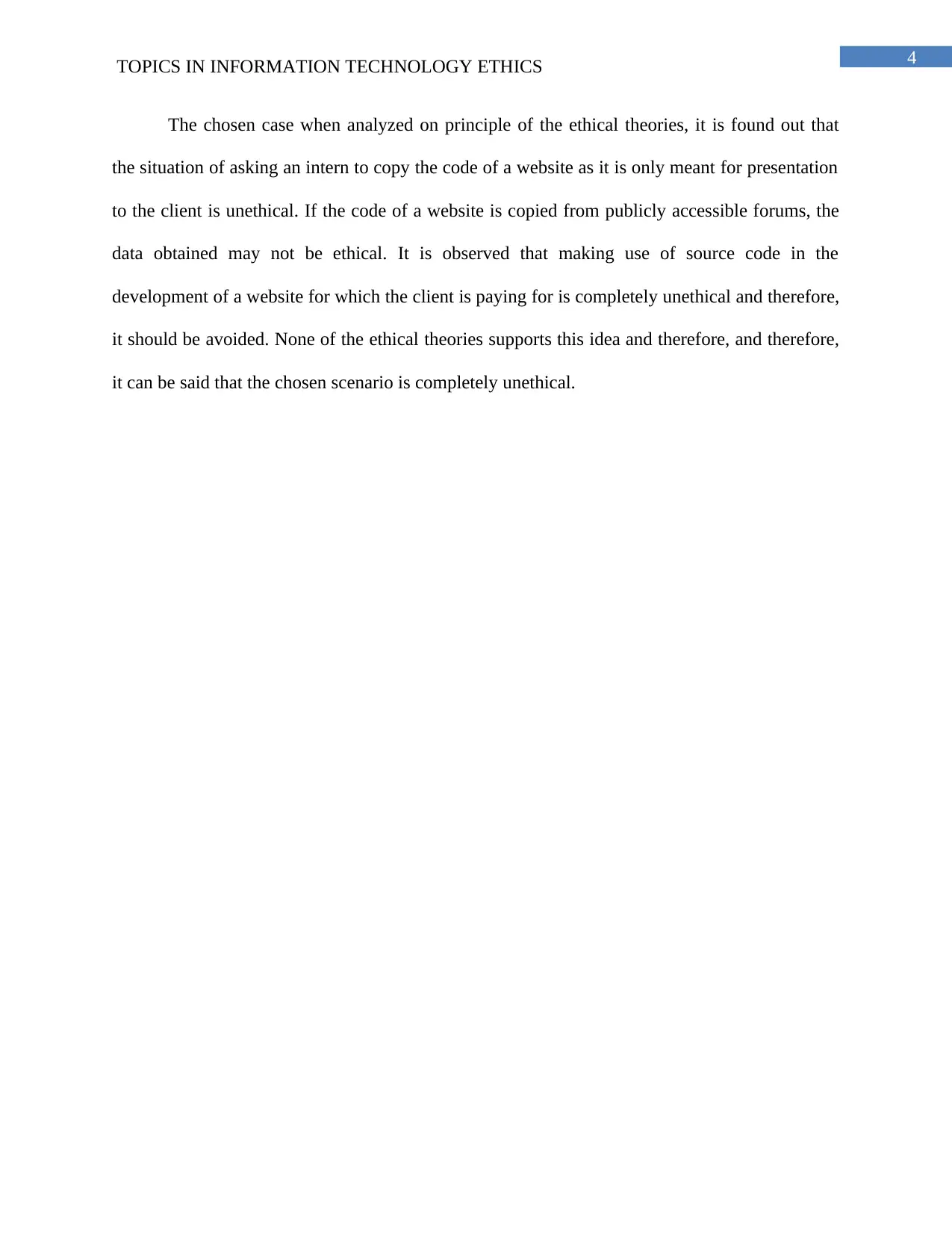
4TOPICS IN INFORMATION TECHNOLOGY ETHICS
The chosen case when analyzed on principle of the ethical theories, it is found out that
the situation of asking an intern to copy the code of a website as it is only meant for presentation
to the client is unethical. If the code of a website is copied from publicly accessible forums, the
data obtained may not be ethical. It is observed that making use of source code in the
development of a website for which the client is paying for is completely unethical and therefore,
it should be avoided. None of the ethical theories supports this idea and therefore, and therefore,
it can be said that the chosen scenario is completely unethical.
The chosen case when analyzed on principle of the ethical theories, it is found out that
the situation of asking an intern to copy the code of a website as it is only meant for presentation
to the client is unethical. If the code of a website is copied from publicly accessible forums, the
data obtained may not be ethical. It is observed that making use of source code in the
development of a website for which the client is paying for is completely unethical and therefore,
it should be avoided. None of the ethical theories supports this idea and therefore, and therefore,
it can be said that the chosen scenario is completely unethical.
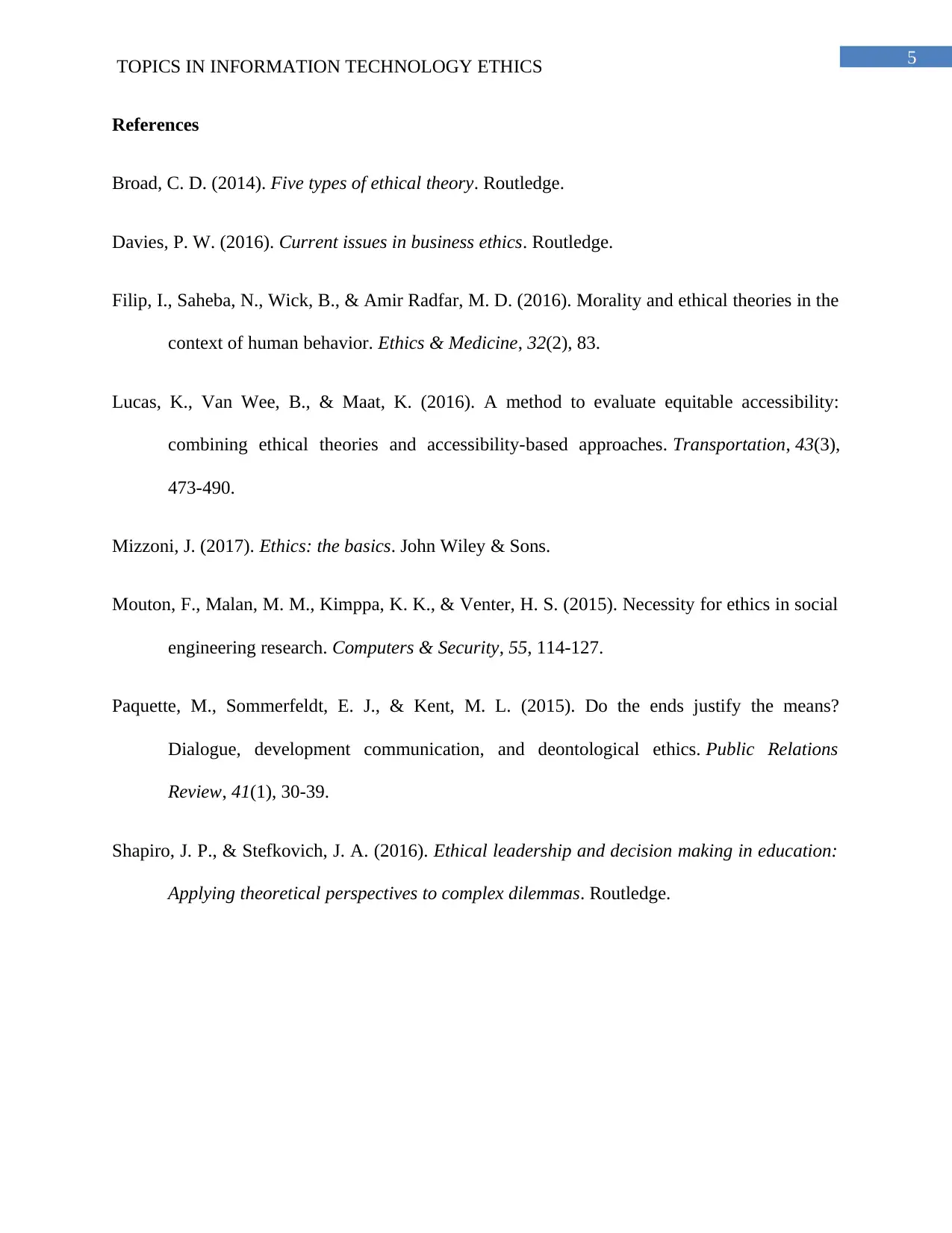
5TOPICS IN INFORMATION TECHNOLOGY ETHICS
References
Broad, C. D. (2014). Five types of ethical theory. Routledge.
Davies, P. W. (2016). Current issues in business ethics. Routledge.
Filip, I., Saheba, N., Wick, B., & Amir Radfar, M. D. (2016). Morality and ethical theories in the
context of human behavior. Ethics & Medicine, 32(2), 83.
Lucas, K., Van Wee, B., & Maat, K. (2016). A method to evaluate equitable accessibility:
combining ethical theories and accessibility-based approaches. Transportation, 43(3),
473-490.
Mizzoni, J. (2017). Ethics: the basics. John Wiley & Sons.
Mouton, F., Malan, M. M., Kimppa, K. K., & Venter, H. S. (2015). Necessity for ethics in social
engineering research. Computers & Security, 55, 114-127.
Paquette, M., Sommerfeldt, E. J., & Kent, M. L. (2015). Do the ends justify the means?
Dialogue, development communication, and deontological ethics. Public Relations
Review, 41(1), 30-39.
Shapiro, J. P., & Stefkovich, J. A. (2016). Ethical leadership and decision making in education:
Applying theoretical perspectives to complex dilemmas. Routledge.
References
Broad, C. D. (2014). Five types of ethical theory. Routledge.
Davies, P. W. (2016). Current issues in business ethics. Routledge.
Filip, I., Saheba, N., Wick, B., & Amir Radfar, M. D. (2016). Morality and ethical theories in the
context of human behavior. Ethics & Medicine, 32(2), 83.
Lucas, K., Van Wee, B., & Maat, K. (2016). A method to evaluate equitable accessibility:
combining ethical theories and accessibility-based approaches. Transportation, 43(3),
473-490.
Mizzoni, J. (2017). Ethics: the basics. John Wiley & Sons.
Mouton, F., Malan, M. M., Kimppa, K. K., & Venter, H. S. (2015). Necessity for ethics in social
engineering research. Computers & Security, 55, 114-127.
Paquette, M., Sommerfeldt, E. J., & Kent, M. L. (2015). Do the ends justify the means?
Dialogue, development communication, and deontological ethics. Public Relations
Review, 41(1), 30-39.
Shapiro, J. P., & Stefkovich, J. A. (2016). Ethical leadership and decision making in education:
Applying theoretical perspectives to complex dilemmas. Routledge.
⊘ This is a preview!⊘
Do you want full access?
Subscribe today to unlock all pages.

Trusted by 1+ million students worldwide
1 out of 6
Related Documents
Your All-in-One AI-Powered Toolkit for Academic Success.
+13062052269
info@desklib.com
Available 24*7 on WhatsApp / Email
![[object Object]](/_next/static/media/star-bottom.7253800d.svg)
Unlock your academic potential
Copyright © 2020–2026 A2Z Services. All Rights Reserved. Developed and managed by ZUCOL.





